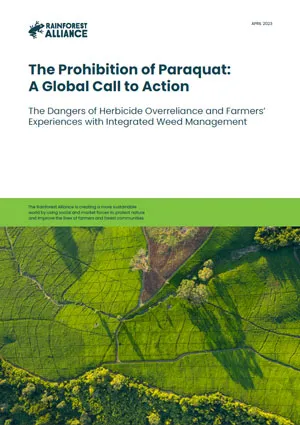The Prohibition of Paraquat: A Global Call to Action
Paraquat is a herbicide-widely used by industrial agricultural plantations and smallholder farmers alike due to its low cost and broad-spectrum efficacy. While an effective herbicide, it is harmful for the environment, the farm ecosystem and highly toxic to humans. Small quantities of paraquat are fatal, and there is no antidote for it, making it a leading cause of death among farmers and rural community members. The Rainforest Alliance prohibited paraquat in its first sustainable agriculture standard, published in 1993. Since then, and in close collaboration with farmers we have shown that key crops can be grown without paraquat in tropical agriculture supply chains.
The global response to a ban on paraquat has been slow, although efforts—including its prohibition in the Rainforest Alliance Certification Program—show a ban can be successful. But without a global phase-out, its negative impacts will continue. This report identifies the main barriers to a successful phase out, including slow government mobilization, and active attempts by agrochemical companies to maintain production and sales of paraquat despite scientific consensus on the dangers posed. And provides recommendations to accelerate paraquat’s global phase out.
